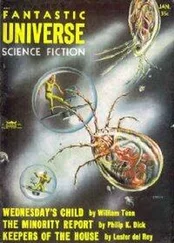William Tenn - Time in Advance
Здесь есть возможность читать онлайн «William Tenn - Time in Advance» весь текст электронной книги совершенно бесплатно (целиком полную версию без сокращений). В некоторых случаях можно слушать аудио, скачать через торрент в формате fb2 и присутствует краткое содержание. Год выпуска: 1956, Издательство: Galaxy Publishing Corporation, Жанр: Фантастика и фэнтези, на английском языке. Описание произведения, (предисловие) а так же отзывы посетителей доступны на портале библиотеки ЛибКат.
- Название:Time in Advance
- Автор:
- Издательство:Galaxy Publishing Corporation
- Жанр:
- Год:1956
- ISBN:нет данных
- Рейтинг книги:5 / 5. Голосов: 1
-
Избранное:Добавить в избранное
- Отзывы:
-
Ваша оценка:
- 100
- 1
- 2
- 3
- 4
- 5
Time in Advance: краткое содержание, описание и аннотация
Предлагаем к чтению аннотацию, описание, краткое содержание или предисловие (зависит от того, что написал сам автор книги «Time in Advance»). Если вы не нашли необходимую информацию о книге — напишите в комментариях, мы постараемся отыскать её.
magazine in 1956.
Time in Advance — читать онлайн бесплатно полную книгу (весь текст) целиком
Ниже представлен текст книги, разбитый по страницам. Система сохранения места последней прочитанной страницы, позволяет с удобством читать онлайн бесплатно книгу «Time in Advance», без необходимости каждый раз заново искать на чём Вы остановились. Поставьте закладку, и сможете в любой момент перейти на страницу, на которой закончили чтение.
Интервал:
Закладка:
“Thank you very much, Mr. Henck, but Herkimer’s Wasp has already been seen by and described to our audience at least three times in the past on the Interstellar Travelogue, which is carried by this network, as you ladies and gentlemen no doubt remember, on Wednesday evening from seven to seven-thirty P.M. terrestrial standard time. And now, Mr. Crandall, let me ask you, sir: How does it feel to be back?”
Crandall stepped up and was put through almost exactly the same verbal paces as his fellow prisoner.
There was one major difference. The announcer asked him if he expected to find Earth much changed. Crandall started to shrug, then abruptly relaxed and grinned. He was careful to make the grin an extremely wide one, exposing a maximum of tooth and a minimum of mirth.
“There’s one big change I can see already,” he said. “The way those cameras float around and are controlled from a little switchbox in the cameraman’s hand. That gimmick I wasn’t around the day I left. Whoever invented it must have been pretty clever.”
“Oh, yes?” The announcer glanced briefly backward. “You mean the Stephanson Remote Control Switch? It was invented by Frederick Stoddard Stephanson about five years ago—Was it five years, Don?”
“Six years,” said the cameraman. “Went on the market five years ago.”
“It was invented six years ago,” the announcer translated. “It went on the market five years ago.”
Crandall nodded. “Well, this Frederick Stoddard Stephanson must be a clever man, a very clever man.” And he grinned again into the cameras. Look at my teeth, he thought to himself. I know you’re watching, Freddy. Look at my teeth and shiver.
The announcer seemed a bit disconcerted. “Yes,” he said. “Exactly. Now, Mr. Crandall, what would you describe as the most horrifying experience in your entire… ”
After the TV men had rolled up their equipment and departed, the two pre-criminals were subjected to a final barrage of questions from the feature writers and columnists in search of odd shreds of color.
“What about the women in your life?”
“What books, what hobbies, what amusements filled your time?”
“Did you find out that there are no atheists on convict planets?”
“If you had the whole thing to do over again—”
As he answered, drably, courteously, Nicholas Crandall was thinking about Frederick Stoddard Stephanson seated in front of his luxurious wall-size television set.
Would Stephanson have clicked it off by now? Would he be sitting there, staring at the blank screen, pondering the plans of the man who had outlived odds estimated at ten thousand to one and returned after seven full, unbelievable years in the prison camps of four insane planets?
Would Stephanson be examining his blaster with sucked-in lips—the blaster that he might use only in an open-and-shut situation of self-defense? Otherwise, he would incur the full post-criminal sentence for murder, which, without the fifty per cent discount for punishment voluntarily undergone in advance of the crime, was as much as fourteen years in the many-pronged hell from which Crandall had just returned?
Or would Stephanson be sitting, slumped in an expensive bubblechair, glumly watching a still-active screen, frightened out of his wits but still unable to tear himself away from the well-organized program the network had no doubt built around the return of two—count ’em: two!—homicidal pre-criminals?
At the moment, in all probability, the screen was showing an interview with some Earthside official of the Interstellar Prison Service, an expansive public relations character who had learned to talk in sociology.
“Tell me, Mr. Public Relations,” the announcer would ask (a different announcer, more serious, more intellectual), “how often do pre-criminals serve out a sentence for murder and return?”
“According to statistics—” a rustle of papers at this point and a penetrating glance downward—“according to statistics, we may expect a man who has served a full sentence for murder, with the 50 per cent pre-criminal discount, to return only once in 11.7 years on the average.”
“You would say, then, wouldn’t you, Mr. Public Relations, that the return of two such men on the same day is a rather unusual situation?”
“Highly unusual or you television fellas wouldn’t be in such a fuss over it.” A thick chuckle here, which the announcer dutifully echoes.
“And what, Mr. Public Relations, happens to the others who don’t return?”
A large, well-fed hand gestures urbanely. “They get killed. Or they give up. Those are the only two alternatives. Seven years is a long time to spend on those convict planets. The work schedule isn’t for sissies and neither are the life-forms they encounter—the big man-eating ones as well as the small virus-sized types.
“That’s why prison guards get such high salaries and such long leaves. In a sense, you know, we haven’t really abolished capital punishment; we’ve substituted a socially useful form of Russian Roulette for it. Any man who commits or pre-commits one of a group of particularly reprehensible crimes is sent off to a planet where his services will benefit humanity and where he’s forced to take his chances on coming back in one piece, if at all. The more serious the crime, the longer the sentence and, therefore, the more remote the chances.”
“I see. Now, Mr. Public Relations, you say they either get killed or they give up. Would you explain to the audience, if you please, just how they give up and what happens if they do?”
Here a sitting back in the chair, a locking of pudgy fingers over paunch. “You see, any pre-criminal may apply to his warden for immediate abrogation of sentence. It’s just a matter of filling out the necessary forms. He’s pulled off work detail right then and there and is sent home on the very next ship out of the place. The catch is this: Every bit of time he’s served up to that point is canceled—he gets nothing for it.
“If he commits an actual crime after being freed, he has to serve the full sentence. If he wants to be committed as a pre-criminal again, he has to start serving the sentence, with the discount, from the beginning. Three out of every four pre-criminals apply for abrogation of sentence in their very first year. You get a bellyful fast in those places.”
“I guess you certainly do,” agrees the announcer. “What about the discount, Mr. Public Relations? Aren’t there people who feel that’s offering the pre-criminal too much inducement?”
The barest grimace of anger flows across the sleek face, to be succeeded by a warm, contemptuous smile. “Those are people, I’m afraid, who, however well-intentioned, are not well versed in the facts of modern criminology and penology. We don’t want to discourage pre-criminals; we want to encourage them to turn themselves in.
“Remember what I said about three out of four applying for abrogation of sentence in their very first year? Now these are individuals who were sensible enough to try to get a discount on their sentence. Are they likely to be foolish enough to risk twice as much when they have found out conclusively they can’t stand a bare twelve months of it? Not to mention what they have discovered about the value of human life, the necessity for social cooperation and the general desirability of civilized processes on those worlds where simple survival is practically a matter of a sweepstakes ticket.
“The man who doesn’t apply for abrogation of sentence? Well, he has that much more time to let the desire to commit the crime go cold—and that much greater likelihood of getting killed with nothing to show for it. Therefore, so few pre-criminals in any of the categories return to tell the tale and do the deed that the social profit is absolutely enormous! Let me give you a few figures.
Читать дальшеИнтервал:
Закладка:
Похожие книги на «Time in Advance»
Представляем Вашему вниманию похожие книги на «Time in Advance» списком для выбора. Мы отобрали схожую по названию и смыслу литературу в надежде предоставить читателям больше вариантов отыскать новые, интересные, ещё непрочитанные произведения.
Обсуждение, отзывы о книге «Time in Advance» и просто собственные мнения читателей. Оставьте ваши комментарии, напишите, что Вы думаете о произведении, его смысле или главных героях. Укажите что конкретно понравилось, а что нет, и почему Вы так считаете.












